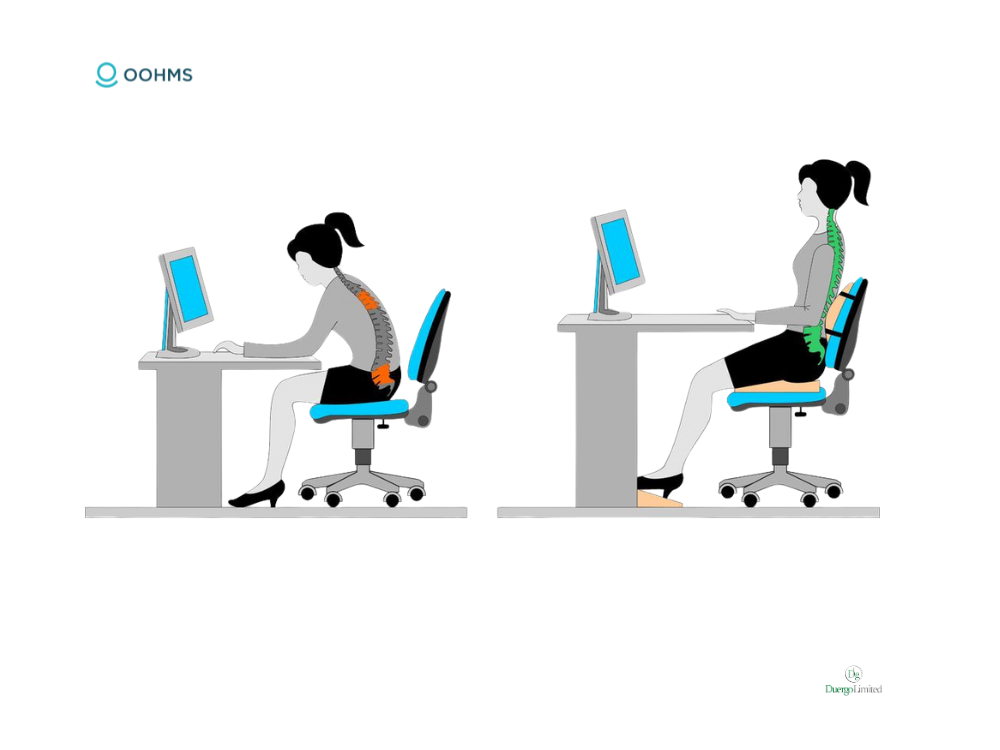5 Posture Mistakes You Don’t Realize You’re Making

Welcome back to the office, my fellow corporate warriors!
It’s the start of a new year, and everyone is settling back into their work routine—whether at the office or the comfort of their home office. While setting up your workspace to fit your needs and ensure comfort is crucial, it’s equally important to pay attention to your posture. Some postures might feel comfortable initially but can gradually cause damage to your body.
Good posture is more than just standing tall or sitting straight; it’s a cornerstone of overall health and well-being. Poor posture can sneak into your daily habits, causing pain, fatigue, and even long-term health issues.[1] Many people unknowingly make posture mistakes that contribute to these problems. Let’s uncover five common posture mistakes and how to fix them.
Slouching in Your Chair
Slouching is one of the most common posture mistakes, especially for those who work at desks for long hours. When you slouch, your spine loses its natural alignment, leading to back pain and muscle tension.[2]
Why it Happens:
- Weak core muscles.
- Poorly designed chairs.
- Long periods of sitting without breaks.
How to Fix It:
- Choose a chair with lumbar support to maintain the natural curve of your lower back.
- Sit with your feet flat on the floor and your knees at a 90-degree angle.
- Take breaks at least every 30 minutes to stand, stretch, and reset your posture. The OOHMS Break app is a great tool to use to encourage taking breaks and stretching, you can monitor their posture and it also ensures adherence to routines by reminding you of your schedules with the use of pop-up notifications. It also has a wide range of 3d exercises that target different parts of the body.
Forward Head Posture
With the rise of smartphones and laptops, forward head posture has become a modern epidemic. This occurs when your head juts forward, putting extra strain on your neck and upper back.[3]

Why it Happens:
- Looking down at devices for prolonged periods.
- Poor monitor height.
How to Fix It:
- Keep your screen at eye level to avoid looking down.
- Use a document holder to keep printed materials at eye height.
- Practice chin tucks by gently pulling your head back to align with your spine.
Crossing Your Legs
While crossing your legs may feel comfortable, it can lead to hip and back imbalances over time. This posture habit can also impede blood circulation.[4] The longer and more often you sit cross-legged, the more likely it is that you’ll have long-term changes in the muscle lengths and bone arrangements in your pelvis.[5]
 Why it Happens:
Why it Happens:
- Habitual sitting positions.
- Lack of awareness of proper leg placement.
How to Fix It:
- Sit with both feet flat on the ground.
- If you find it hard to resist crossing your legs, consider using a footrest.
- Strengthen your hip and core muscles to improve seated posture.
Overarching Your Lower Back
Overarching, or lumbar lordosis, occurs when the lower back is excessively arched, often due to standing or sitting incorrectly. [6]

Why it Happens:
- Weak abdominal muscles.
- Wearing high heels frequently.
- Poor posture habits.
How to Fix It:
- Engage your core muscles to support your spine.
- Adjust your chair height to ensure your hips are slightly above your knees.
- Avoid prolonged use of high heels, which tilt the pelvis forward.
Hunching Over
Hunching over often happens when you lean too far forward while working, causing strain on your upper back and shoulders. This posture mistake can lead to tension headaches and chronic discomfort.[7]

Why it Happens:
- Sitting too far from your desk.
- Poor desk and monitor setup.
- Fatigue or lack of awareness.
How to Fix It:
- Sit close enough to your desk to avoid leaning forward.
- Adjust your monitor so the top of the screen is at or just below eye level.
- Strengthen your upper back muscles to maintain proper alignment.
Why Correcting Posture Matters
Bad posture doesn’t just cause physical discomfort; it affects your energy levels, breathing, and even confidence. By addressing these common posture mistakes, you can:
- Reduce pain and discomfort.
- Improve focus and productivity.
- Prevent long-term health issues.
Small changes to your daily habits can have a big impact on your posture and overall health. Start by identifying which of these posture mistakes you’re making and apply the recommended fixes. Your body will thank you for it!
